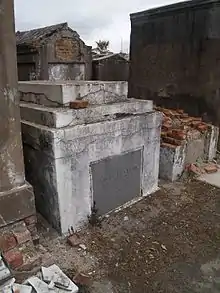Nicholas Girod
Nicolas Girod (French spelling) or Nicholas Girod (April 1751—September 1840)[1] was the fifth mayor of New Orleans, from late in 1812 to September 4, 1815.[2]

Biography
Born in Cluses (Savoy, then part of the Kingdom of Sardinia), he presided over the then-Francophone city during the 1814-15 British invasion.
(General Andrew Jackson declared martial law upon entering New Orleans in December 1814, having marched overland from present-day southern Alabama and then crossing Lake Pontchartrain. He ruled over the city until ending martial law in March 1815.) [3]
Nicolas Girod (1751-1840) was the mayor of New Orleans from 1812-1815. Born in Savoy, he migrated to Spanish Louisiana in the late 1770s with brother Claude François [1752-1813) and brother-in-law Andre-Marie Quetant and was later joined by brother Jean François (1773-1850). He prospered as a commission merchant and owner of extensive property in New Orleans, especially in the American quarter. The war of 1812 severely limited his hopes for material growth of the city. He resigned office September 4, 1815 to salvage his waning personal finances. He never married and had no children.
Nicolas Girod was of Protestant faith, in a predominantly Catholic city. He was the first regularly-elected mayor of New Orleans after Louisiana's admission to the Union. He was initially elected on September 21, 1812. Girod took office on November 5 of that year and served until September 4, 1814; at which date he was re-elected, resigning on September 4, 1815.[4]
Girod was a member of a prominent family who owned considerable interests in shipping and mercantile enterprises. He was one of three brothers (Jean Francois and Claude Francois being the other two) with brother-in-law Andre Quetand who conducted commercial enterprises with area planters in what was known as the commission or factorage business. The Girods kept a wholesale and retail store in the vicinity of the levee landing, which in later years was transferred to the building at the corner of Chartres and St. Louis streets. He owned a large number of properties in the area of today's Central Business District, in the vicinity of Girod Street.[4]
New Orleans was full of excitement in the spring of 1821 when Girod remodeled and furnished the house on Chartres Street, that he inherited from Claude Francois Girod, in readiness for Napoleon Bonaparte. The ship Seraphine was being outfitted for a secret voyage by Commander Bossier and Dominique You, and Nicolas Girod was one of the sponsors of the plan to rescue Napoleon from his exile in Saint Helena; but Napoleon's death frustrated this plan.[4]
A residence was established for Napoleon at Chartres and St Louis streets by Nicholas Girod, and the ship "Seraphine" was built and equipped with the object of rescuing Napoleon from St. Helena. Under command of Capt. Bossier and Dominique You, the expedition set sail with this purpose, but returned when signalled by a French merchantman that Napoleon had died May 5, 1821. (Source: ART AND ARTIS'l'S IN NEW ORLEANS DURING THE LAST CENTURY BY ISAAC MONROE CLINE reprinted from blennialreport, Louisiana State Museum, 1922)
Girod was quite a philanthropist. Among other provisions in his 1837 holographic will, he left a bon (obligation) of $100,000 to be applied to the construction of a facility in Orleans Parish for the housing and care of Louisiana's French orphans. Other institutions and individuals were recipients under this will, including Charity Hospital, $30,000.[4]
Nicolas Girod died on September 1, 1840, at his home located on the corner of Chartres and St. Louis streets.[4] His former residence in the French Quarter is now known as the Napoleon House. Both New Orleans and Mandeville, Louisiana, have a Girod Street, named in Nicolas Girod's honor.
References
- Birth and death dates inscribed on tombstone
- Eric J. Brock (1999). New Orleans. Arcadia Publishing. ISBN 0-7385-0223-5.
- Remini, Robert V. (1999), The Battle of New Orleans.
- Profile of Nicolas Girod, dated Oct. 7, 2002 at New Orleans Public Library website
External links
- Girod administration at New Orleans Public Library website, transcription from a 1940 WPA compilation
- Nicolas Girod at Find a Grave
| Political offices | ||
|---|---|---|
| Preceded by Charles Trudeau |
Mayor of New Orleans October 8, 1812 – November 5, 1812 |
Succeeded by LeBreton Dorgenois |
| Preceded by LeBreton Dorgenois |
Mayor of New Orleans December 5, 1812 – September 4, 1815 |
Succeeded by Augustin de Macarty |